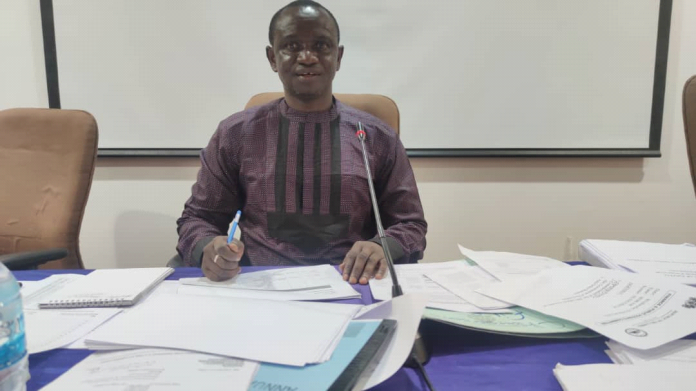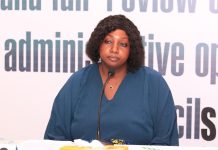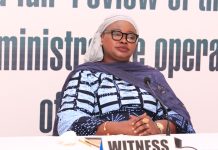By: Kebba AF Touray
Hon. Darboe
The Finance and Public Accounts Committee (FPAC) has reported that the Gambia Technical Training Institute (GTTI) owes the Ministry of Higher Education Research Science and Technology (MoHERST), an amount of one million, seven hundred and nineteen thousand, three hundred and sixty-nine Dalasi (D1,719,369). The committee also indicated that the balance due to GTTI by its line Ministry as of 31 December 2020, amounts to five million, two hundred and six thousand, three hundred and thirty-five Dalasi (D5,206,352.00), noting that there has been no reconciliation of these inter-company transactions.
The reports were conveyed to FPAC through the 2019 accounts of the government’s COVID-19 phase two report, the Financial Statements of Agencies, Institutions; Municipalities, and Area Council, by its Chairperson Hon. Alhagie S Darboe. According to Hon Darboe, the annual audit plan by the internal audit also failed to include Internal Audit Reports which were never reviewed nor agreed upon with Management, noting that there were no agreed timelines for the implementation of the internal audit recommendations.
Hon. Darboe asserted that the framework of the agreement between the Institute and the line Ministry regarding pre-financing arrangements was not presented for review and that account balances over the years 2018 to 2020, were provided. He reported that the balance due to MoHERST as of 31st December 2018 was D389,250.00, adding that as of 31 December 2019, that balance was D1,719,369.00 and the balance due to GTTI as of 31st December 2020, was D5,206,352.00 and that there was no reconciliation of these inter-company transactions. Darboe said The Gambia Technical Training Institute (GTTI) presented annual activity reports and audited financial statements for the years ended 31st December 2017 to 31st December 2020. The GPPA, he said, has only done a compliance review on GTTI for 2017.
“Key findings and observations by the committee including the Annual Audit Plans prepared by the Internal audit for the years under review, were not submitted to the Governing Council for approval, and the plan failed to include other critical areas such as risk management procedures,” he reported.
Hon. Darboe added that the plan also failed to include information systems, governance processes, compliance reviews on laws and regulations, procurement and contract management, and the internal auditor’s report directly to the Senior Management of the Institute, instead of the Audit Sub-Committee of the Board. He indicated that bank reconciliations were not prepared on a timely basis and related reconciling items were also not investigated and resolved on a timely basis, resulting in undue long outstanding reconciliation items including a number of material transactions in 2019 that appeared in the December 2020 bank reconciliations. Hon. Darboe also indicated that the Institute has not been carrying out period-end (month-end, financial year-end) reviews of their transactions, saying “it was not possible to make an informed analysis of income generated as well as expenditure incurred by each Annex, making it difficult to make any informed strategic decision, especially on their financial viability as well as their funding needs.”
On SSHFC payments in respect of January 2019, Hon. Darboe said these are not in the file, with the April and July 2019 SSHFC payments being delayed for 86 days and 31 days respectively, and that April and July PAYE payments were delayed for 30 and 28 days respectively.
According to Hon. Darboe, the Auditors were unable to locate a number of computers during the verification of the fixed assets for 2020, saying the identification codes provided in the fixed assets register are different from the codes on the physical asset. He said the periodic verification of fixed assets was not done during the years under review in order to reconfirm the locations and current operational conditions of the assets.
“The Access Database previously used to keep basic information on students has been discontinued and the Institute is now relying heavily on manual records kept in hard copies,” he added, recommending that Internal Auditors report directly to the Board Sub-Committee, and the overall planning of the internal audit work be reviewed.
He said the Institute should operate in line with its approved annual budget and desist from all forms of pre-financing arrangements.
“Reconciliation should be done on a timely basis and the resulting reconciling items should be investigated and resolved in a timely manner. Internal Audit should carry out reviews of the general ledger postings and account balances to ensure that postings are accurate and complete,” he said, adding that management should ensure that statutory deductions are paid to their respective institutions within the required timeline and that management should review its current chart of account structure (CoA) with a view to aligning them with the reporting needs of the Institute in order to facilitate strategic financial decision-making.
He said payment vouchers and bank transfers in respect of purchase of computers in 2019, were also not seen.
The FPAC Chairperson further said that the related supporting documents could not be verified, as such management should check the related documents and file them accordingly.
“Periodic verification of the fixed assets to reconfirm their current locations and operational conditions should be updated in the asset register and should also advise management on the possible disposal of non-functional assets,” FPAC recommended.
He said the committee also recommended that movable items such as computers should be duly signed for by their recipients as confirmation of having received the asset in question, and management should review current systems with a view to putting in place more effective automated systems.





















